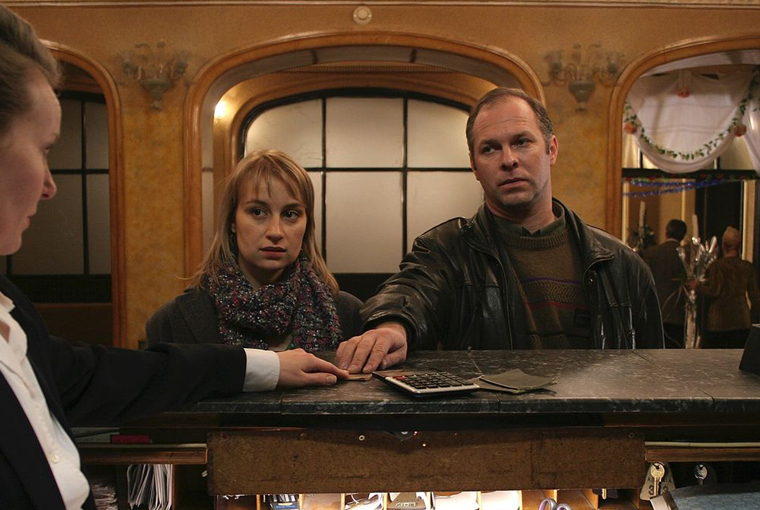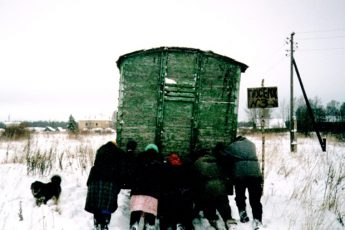No Place to Die
Cristi Puiu’s The Death of Mr. Lăzărescu (2005) and Cristian Mungiu’s 4 Months, 3 Weeks and 2 Days (2007)
Vol. 6 (June 2011) by Moritz Pfeifer
Romania 1966. During the second year of his term, Nicolae Ceauşescu’s illegalizes abortion. The new law, called decree 770, will last more than two decades, drastically increasing Romanian’s population, but cutting short the lives of thousands of women dying from the consequences of illegal abortions. In 2008, almost twenty years after Ceauşescu’s death, the fall of his regime, and the abandonment of the decree, Cristian Mungiu’s film 4 Months, 3 Weeks and 2 Days, set in Bucharest in 1987, recalls the life of a young student, Gabrita (Laura Vasiliu), who tries to interrupt her pregnancy. Mungiu calmly depicts the plan and procedure of Gabrita’s abortion, and the way for her to get there seems as gruesome as the anatomical detail of its outcome.
Ye Mungiu’s film is not a case study of pros and cons on abortion. Rather it portrays the anxiety a society has about death and its denial of it. In that way, the film has a lot in common with Cristi Puiu’s The Death of Mr. Lăzărescu, a film about the story of a retired engineer, Dante Remus Lăzărescu, who starts off the night with a headache and ends up dead in the morning, after enduring innumerable diagnoses from four different hospitals.
In both works there is a person confronted with death. In 4 months, Gabrita risks her own death preventing the life of her fetus; in Lăzărescu, Dante slowly meanders towards the end of his life. Most strikingly though, both deaths take place in an anonymous environment, a hotel room, and a hospital. 4 months, in a tragic way, and Lăzărescu, perhaps more in an absurd one, show how death is displaced out of the social and psychological sphere. Of course, there is no place for dying in a society built upon a life-imposing imperative. Paradoxically though, the imperative to live causes the loss of the lives it wants to keep.
Both Gabrita and Dante have an accomplice. Otilla, Gabrita’s roommate, is antagonistic to the oppressive system she has to deal with even if she cannot change or escape it. The nurse in Lăzărescu seems to be the only person concerned with the patients feeling. The question of compassion confronts Otilla with the tragedy of her situation. While helping her friend to break the law, she not only risks to face abominable consequences herself, but she above all she has to struggle whether to grieve or to remain silent.
In 4 months, happiness seems to be a moral duty, if not a social obligation. The birthday party scene horribly portrays this, where Otilla, coming from the hotel room, sits at the head of the dinner table surrounded by the celebrating family of her boyfriend. But she does not participate. Minute after minute we see her staring absentmindedly into oblivion. No one asks why she would not fit in. Even her boyfriend, talking to Otilla alone, avoids any topic that could disturb the tranquility of their relationship. She seems to insult the company. Her smoking in front of her boyfriend’s parents is seen as the breaking of a taboo which must seem cruel compared to the place she is coming from. One guest feels obligated to share some of his bon esprit with the young women, not making things better of course. Signs of sadness are avoided and remain unrecognized. If one is not in the mood, one feels compelled to at least pretend to be happy.
Where happiness is necessary, mourning and death reappear as forms of deviation. Otilla leaves the party but finally she cannot escape the propriety that her environment seems to demand. Her attempt to bury the fetus fails, refusing her to perform a mourning gesture, and hence personally recognize and experience loss. It seems as though the moral inconceivability of the abortion turns it into something that de facto never happened.
The hotel room Gabrita and Otilla inhabit to perform Gabrita’s abortion has an understandable concealing function because there is no public place for getting rid of a pregnancy. But the abortion comports yet another dimension that has a lot in common with the impassible anonymity of the hotel room. Gabrita has to remain secret. The hotel room is not only a temporal condition of life Gabrita inhabits. She must herself accept the place of the hotel room as not existing, meaning that she has to adopt a state of denial. In fact she already is in denial when the film starts, not wanting to reveal the state of her pregnancy. But it is Otilla, who suggests, in the final scene of the film, to never talk about what happened.
The last scene in the hotel lobby encloses the two women into an anonymous vacuum whose distorted reality is beginning to look familiar. They are no longer guests in a place where there’s no one to encounter, that has pronounced eternal silence as its unwritten constitution.
Dante in Lăzărescu similarly has to deal with a state of denial concerning his own death. There is no doctor that can actually tell him that he will die. Instead, his doctors take refuge in a medical jargon, each sanctifying the patient with a different diagnosis that does not seem to matter; least of all to the patient.
As the hotel room for Gabrieta, the different hospitals Dante frequents seem to reflect the attitudes of the people he comes across. The hospital in Lăzărescu reappears as a place of hope that promises medical salvation at all costs. But the premise that cure has be possible soon converts the place into a Promethean apparatus. Is it always necessary to interfere with bodily decay ? Does medicine always have a curing effect? Indeed, it would not be absurd to suggest that Dante dies of over-treatment. Maybe he would have enjoyed life longer if he would have stayed on his couch, where we see him through the films opening sequences. Gabrita’s fate in 4 months has also shown that the people that decide whether this or that medical invention is permitted or prohibited, whether it is morally right or wrong, can injure in ways that provide no cure. The attempt to regulate medical possibilities can have unforeseeable effects and dangers that recall the tyrannical control of the authorities in the Promethean myth.
Paradoxically, the people that have the power to decide over the fate of Dante refuse to take responsibility, most of all they seem unable to tell him that there is nothing more that they can do. After every examination the doctors have something, if it be, to shove him to a different doctor as if to say that “death is not my field.” Thus, even though the doctors in Lăzărescu don’t lack the choices, they don’t seem very keen to make them. Instead, they withdraw into an absurd routine whose dictate “do something” literally turns their job into an endless undertaking.
As the hotel room, the hospital is an anonymous place that seems to invite its guest to hide things. Dante’s visible pain is not encountered with pity or care but with repugnance. He is improper. Similar to Otilla’s smoking, Dante’s behavior, drinking and wetting his pants, is not seen as the epiphenomenon of his illness but as the effect of a mental problem. His presence seems too morbid to fit in a room. It seems as though Dante like Otilla, is forced to keep good spirits. Ironically he reacts to that demand, adopting a jocular language that not only mirrors the incoherent gibberish of his doctors, but recalls the logical absurdity of their desire for a patient in happy health. Sickness is a matter of attitude.
Dante appears to sense that his time is up, recalling into memory fragments of his life. But doesn’t the impossibility to speak also testify that there is no language for the last hours of one’s life? He can no longer play the fool. The sense of dying is a lost feeling uttered in front of an audience incapable to understand the meaning of death.
The hospital is a place where death is fought and where its defeat is not an exception. But the undesirability of death’s course is distorted when it ceases to be understood as a natural possibility. Both Dante and Gabrita abide within a society refusing death to occur. The places they encounter have the function to hide the people they take in because their life is not supposed to be seen. Within the space of natural life, death and degeneration are part of life’s course. To deny and prohibit death, is to take it out of its natural course, and thus prohibits life itself. But this means that the places are not a priori such that they dictate death’s and life’s impossibility. There are people working there, people living and dying there, people who have built them and people who have invented the machines and products that are used there. Otilla and the nurse try to reestablish life in these places caring about the people who live in them. Physically and mentally they are close to the people they care for, thus breaking the distance between deceivingly exterior and interior places. In the end they succumb but Otilla turns her head towards the audience just before 4 months ends, as if to say “do something.”




Leave a Comment